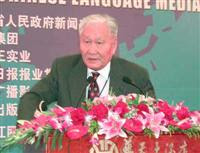(《信报》专栏文章)
Georgia and Russia fought a five-day war before a cease-fire agreement was reached. Western media accuse Russia of invading Georgia. But it was Georgia that started the war. On late August 7 and early August 8, Georgian rockets rained on Tskhinvali, capital of the de facto independent South Ossetia, killing and wounding hundreds, perhaps thousands of people, including Russian peace keepers. Georgian president Mikhail Saakashvili tried to achieve “national re-unification” by force. America’s favorite stan dard-bearer of the “Rose Revolution” miscalculated. The attack brought on a fierce Russian response. The result is that the Russians are in firm control of both South Ossetia and Abkhazia. Russian tanks pushed into the strategic city of Gori, Stalin’s birth place, and moved to within 30 miles of Tbilisi.
According to the New York Times, at first, there was no sign of a Russian offensive. Until August 6, the eve of Georgian attack, there were no Russian troop movements. In fact, Russia was mediating the conflict between Georgia and South Ossetia. But now the United States is accusing Russia of “provocation”. US state department claims that it had repeatedly warned Saakashvili against starting a war it could not win. But only one month ago, U.S. secretary of state Condoleezza Rice was in Tbilisi, loudly proclaiming firm US support for the Georgian president. The US military trained and equipped Georgian troops, and sent more than one thousand US troops to hold joint exercises with Georgian forces. Can any one believe that Saakashvili launched his offensive without US knowledge or acquiescence?
When the war broke out, president Bush was in Beijing for the Olympics. He warned that Georgia’s sovereignty and territorial integrity must be respected. Really? Did he respect the sovereignty and territorial integrity of Iraq? He later said Russia’s behavior is unacceptable in the twenty-first century. But it was he himself, who set the precedent. He invaded and is still occupying an independent country, having gone much further than Russia.
In 1999, former president Clinton and his NATO pals launched an air war against Serbia. Later they supported the independence of Kosovo from Russia’s last ally in Europe, Serbia. At that time Russian president (currently its prime minister) Putin warned that Russia would act according to the same principle and support the independence of South Ossetia and Abkhazia. This is paying the US back in its own coin.
Saakashvili staged the “Rose Revolution” and made “national re-unification” his primary goal. He did recover Adjaria and the Kodori Gorge in Abkhazia. But the latter is now firmly in the hands of the Russians.
The Georgian president also aspires to join NATO and he has Bush’s strong support. NATO’s eastward expansion has been an ardent project of various US administrations in the face of Russia’s resolute objection. Bush is going one step further by going ahead with the setting up of a ballistic missile defense system in Poland and the Czech Republic, in an effort to surround and threaten Russia. Russian Foreign Minister Sergei Lavrov warned that Georgia’s ambition to join NATO “will lead to renewed bloodshed” and Russia “will do anything not to allow Georgia and Ukraine to join NATO”.
Saakashvili earned his law degrees from Columbia and George Washington Universities. He also practiced law in New York. He is passionately pro-America, claiming that he holds “American values”. When Bush visited Tbilisi in May 2005, he mobilized 150,000 Georgians to give Bush a rousing welcome, and actually named a street after the American president. He sent 2000 Georgian troops to Iraq, the third largest contingent after the US and Britain. He has asked that the US airlift these troops back to Georgia to join the fight.
Although the Washington establishment regards him as the best instrument for pushing the color revolution, some have doubts that he is too headstrong, rash and impulsive, and his nationalism exceeds common sense.
Any way, his “Rose Revolution” has long withered. He used riot police and tear gas against peaceful demonstrators. He destroyed an opposition TV station. He has thrown political opponents in jail, labeling them “terrorists” and tortured them. His prisons are filled with political dissidents. He is now asking US and NATO support, and not just humanitarian and moral support. That means military support. But mired in Iraq and Afghanistan and troubled by Iran’s nuclear project, the military option is off the table for America. Former chief of policy planning at the state department Haas said the US has no lever to influence Russia.
Has Russia over reacted? To Putin, the disintegration of the Soviet Union was “the biggest catastrophe of the twentieth century”. Now that Russia is back, flushed with oil money, it wants to bring its “ near abroad” , and especially the Caucasus, back into its sphere of influence, and keep the US out of its “backyard”.
As for the presidential candidates, it is only natural for both McCain and Obama to issue anti-Russian statements. They both urged the administration to step up its effort to get Georgia (and Ukraine) into NATO. McCain’s neocon supporter Robert Kagan wrote in the Washington Post, it was not Saakashvili’s miscalculation, but Putin’s premeditated design that started the war. Kagan even described August 8, 2008 (when the war started) as a turning point in history. Wrong. The real turning point was March 19, 2003, when the US invaded Iraq. That marked the beginning of the relative decline of the United States, and the rise of the “others”, including Russia. The world is entering what Fareed Zakaria called “the post-America era”.

没有评论:
发表评论